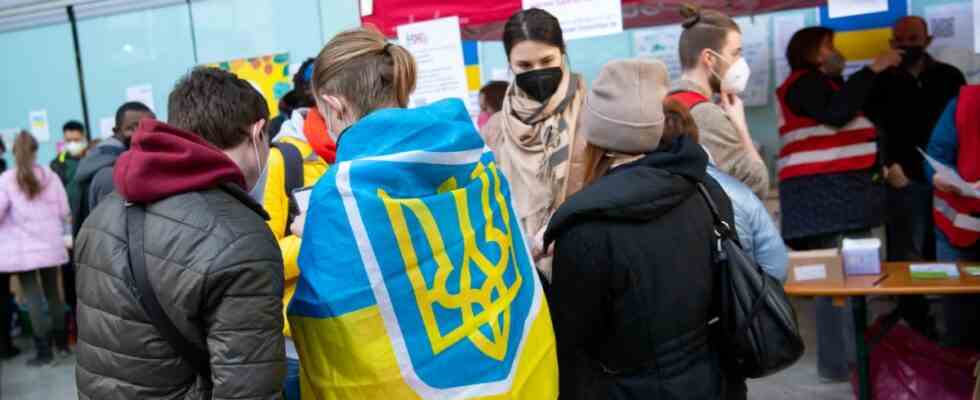The number of refugees coming from Ukraine to the district of Munich is increasing rapidly: As district administrator Christoph Göbel (CSU) announced in the district committee on Monday afternoon, around 1,900 people have now arrived from the war zones. As recently as Friday, there was talk of 1,666 refugees. “The numbers are going up tremendously, I expect that in the end there will be more than in 2015,” said Göbel. During the large number of refugees at the time, particularly from the Middle East, 15,000 people arrived at the emergency shelter in Aschheim within ten weeks.
The district administrator also doesn’t expect the Ukrainians’ stay to be limited to a few weeks: “It is to be feared that people will not dare to return to their homeland, if only because entire cities such as Mariupol, Kyiv and Odessa may also be destroyed soon and they don’t even know if their apartments are still there.” Added to this is the uncertainty as to what happened to the husbands of the women who had fled, where they were staying and whether they would have survived the fighting unscathed.
Originally, it was expected that a total of 50,000 asylum seekers from the Eastern European country would arrive in Bavaria; for this number it was calculated that 1300 of them would come to the district of Munich. But there are already 60,000 refugees in the Free State, explained Martin Scholtysik from the district office.
Most refugees are housed privately. But the district administrator takes precautions and builds numerous larger accommodations
By the weekend, 464 refugees had been accommodated in decentralized accommodation, all the others had found shelter in private apartments. It was only this Monday that more rooms were rented in additional hotels, which means that around 450 places are currently available. But the district administrator promises further efforts in order to be prepared for the expected other new arrivals and also to be able to offer longer-term solutions: “I started ordering containers on the day of the invasion and hoped that the district council wouldn’t rip my head off,” said Göbel with a view to the costs, for which he would normally have required a vote from the district committees. But this was the only way that the first mobile buildings, with space for 260 people, could be set up next week on Biberger Strasse in Unterhaching.
Temporary accommodation is also to be erected soon on Südliche Ingolstädter Straße in Unterschleißheim, on the Heid in Neubiberg, on the old runway, containers for 120 refugees are planned and in Taufkirchen an air dome for up to 300 people is being raised. There would also be two locations in Oberhaching and another air dome on the Bundeswehr parade ground in Unterhaching.
Mobile waiting room: A tent has been set up in the inner courtyard of the district office for refugees from Ukraine who are collecting their electronic residence permit and financial support.
(Photo: district office)
In the district office on Mariahilfplatz, too, operations are now shaped by what is happening in Ukraine: In the inner courtyard, a tent has been set up by the immigration authorities where those who have arrived can wait until they receive their electronic residence permit and can pick up financial support. Around 100 to 120 processes are processed there every day, and according to Göbel they are trying to “bring order out of chaos”, for example with the help of online registration. Administrative processes are also to be relocated to the municipalities on a decentralized basis.
All the efforts that the district of Munich is making also have a clear financial impact. In addition to housing people, there are also integration services such as language classes or schooling. The district administrator announced in the committee that the care key would be higher than usual, for example in social care, which is why 17 additional jobs would have to be created. Although numerous services are reimbursed directly by the state, a supplementary budget of five million euros net for the current year is unavoidable. “E.g. for doctors, administration, temporary workers, care, office supplies.”
There are numerous problems related to the consequences of the Ukraine war that have to be dealt with, and then there is also the Corona problem: According to the district office, only about 30 percent of the refugees are vaccinated, but many with the Russian vaccine Sputnik V, which is used in the EU is not permitted. Göbel has respect when, after mothers and children, grandparents from the Ukraine come to Germany. “That could be fatal: if large numbers of these are not vaccinated, we have an enormous risk group.”

